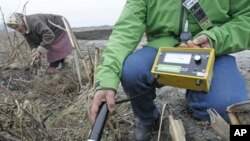Environmental advocacy group Greenpeace says radioactive fallout from the 1986 Chernobyl nuclear power plant explosion still affects food in parts of Ukraine.
The group released a report this week saying samples of milk, berries, potatoes and root vegetables in two Ukrainian regions showed contamination. The regions tested in the investigation are outside the so-called "exclusion zone" around the Chernobyl plant, which has been deemed uninhabitable.
Greenpeace said the tests revealed higher than acceptable levels of cesium-137, a radioactive contaminant, in the foods. Greenpeace scientist Iryna Labunska said the contaminant represents a long-term threat to public health. Labunska criticized the Ukrainian government for stopping regular monitoring of food contamination from Chernobyl two years ago.
The report from Greenpeace comes just a few weeks before the 25th anniversary of the disaster on April 26, 1986. The explosion at the Soviet-built nuclear reactor in the Ukrainian town of Chernobyl sent waves of radioactive material into the air, affecting hundreds of thousands of people.
The disaster at Japan's Fukushima nuclear power plant caused by last month's earthquake and tsunami is being called the world's worst nuclear accident since Chernobyl.
European Union leaders have called for worldwide testing of nuclear plants in the wake of the nuclear crisis in Japan. EU energy ministers agreed last month on the need for EU-wide security checks.
Some information for this report was provided by AP, AFP and Reuters.




